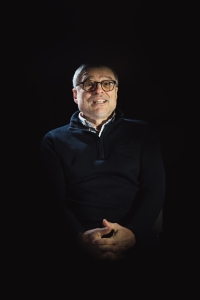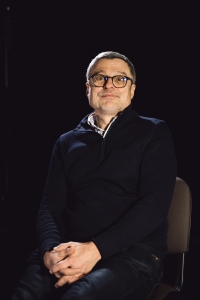Ing. Ľubomír Ftáčnik
* 1957
-
"Unfortunately, after 1989, I didn't have to change, but the world changed in that you had to show color. The people with whom I communicated, I suddenly found out that they were nationalists, they believed in absolute nonsense, they loved Mečiar, and these were painful things. Ideologically and emotionally, you will break up with people who stand somewhere else entirely. I don't understand what's going on at all. They are excited by the tinsel, the populist talk, etc. That was painful, but it cleared the scene. It also affected me very much on a personal level and I still appreciate it to this day. Although I didn't do anything like that, but I had limitations. I couldn't buy the books I wanted. When I went across the border and I was carrying top novels and those customs officials didn't know what it was. And you fought for elementary things. That, of course, is over. For me, that change is more at the level of freedom, and that freedom is a caricature. People who were making decent money until the corona and the crisis of the last two years had a problem of where else to go. Two or three vacations a year. Then they look at the atlas to see where else we're going, because we've already been everywhere. That it grew into a contradiction became a caricature. I can appreciate it, because I was born into a relative lack of freedom in socialist Czechoslovakia. So the difference is huge. "
-
"They offered me such a minimalist collaboration. I have to confess. However, it is also in the annals, it can be traced. I even agreed because my twin brother had such a small problem and I thought I could help him. But I never did anything. There was an American chess player, Whitehead, who was an international champion, and someone in the administration was called that. That was in the late 1980s and then it ended. The person who contacted me, I knew him from the secret service. He discussed with me in such a way, practically about nothing. I never did anything, he did not take away. I confess without torture, I wet myself, but in a way that today sounds comical. I don't know what is written in the annals, but nothing ever happened. Maybe I was the kind that was nurtured if something was needed. Nothing ever happened because 1989 came.”
-
"Once in my life, I had a call from Robert James Fischer, who was the inspiration for the Ladies' Gambit series. He was a controversial world chess champion from the United States who then retired. He had a hard life because he was engaged in stupid things. I would say that he was not quite oriented in the world. Anti-Semitic statements and so on. But as a chess player he was fantastic. He lived in Budapest for a time, after 1992, because he escaped from the USA. He had trouble paying taxes and this - that. And he called me once. He asked me about my best match. Am I really the one and by that he knew he was talking to someone who has some chess sense. He called me because of an article I once wrote for an American magazine, and in that article I quoted one ending that then occurred in the match between Kasparov and Karpov. Fischer's idea was that all the matches the two played were prearranged from A to Z, and he was trying to prove it. Crazy idea! I knew it wasn't right, but I talked to Boby Fischer. There were no mobile phones then, so he found out my number."
-
"In 1982, I was already part of the Olympic team. This means that I played for Czechoslovakia. Also Mr. Plachetka from Slovakia and Czech grandmasters Horst, Smejkal and Janza. We played the Olympics in Luzern, Switzerland. We finished in second place, which was an absolutely historic achievement. The Soviets were the first, we were the second, and the Americans were the third. When we played with the Soviet Union, I played with Polugaevsky. And I beat him in one beautiful game. He was one of the best players in the world at the time. He was completely shocked. He was known to make his hair stand on end when things went wrong. His hair stood on end. He finished the match and had a forest of standing hair. He was shocked. I was a young boy, although gifted, and I was already a grandmaster, but still. He lost a very beautiful game. And I understood after some time that I probably won't play a better game."
-
"The creative part is fantastic. Chess can be very aesthetically impressive. You play the game, and when it's explained, that power of thought, that battle of thoughts in its purest form, won't hurt anyone. You are not destroying anything, you are just comparing who is smarter. Who will catch those aspects. It is beautiful. Chess is a distinctive sport, there is no dispute about that today, but on the other hand it goes beyond sport. Some sports disciplines are such that you see some nice match, but it is not permanent. We can keep the team. I watch games that are 120 years old and still nice and interesting. Of course, played on a slightly different level, but that's something that remains. It's like making a tiny diamond and storing it in a database. The current largest and highest quality database, I participate in it, is processed by the German company ChessBase. There are over 9 million games. "
-
"We read about the events in Czechoslovakia in the Jeruzalem Post. We traveled, we came back and there was no need for exit permission. I experienced this turning point in Israel at the European Championships and I remember like today when they said open borders. Everyone can travel wherever they want. We went for coffee with the French and tried to explain it to them. You've never seen such a blank look. Those people looked at us and didn't know what we were talking about. We couldn't explain to them how impossible it was to travel. They couldn't imagine it at all. That cannot be explained. Just like today, I can't explain anything to my grandchildren. Or to my son, because he was born in 1985 and has never experienced anything like this. "
-
Full recordings
-
Bratislava, 03.02.2022
(audio)
duration: 01:53:37
-
Bratislava , 11.04.2022
(audio)
duration: 01:38:29
Full recordings are available only for logged users.
During chess games, he met the best players in the world
Ľubomír Ftáčnik was born in Bratislava in 1957 as the second child of identical twins. He studied solid particulars physics. From the age of 13, he played chess in the Bratislava chess club Slovan. In 1977, he won the European Junior Championships and became the Junior World Champion. In 1980, he became a grandmaster. He was the champion of Czechoslovakia four times. Ľubomír played for the Czechoslovak Republic seven times at the Chess Olympiad and is equally responsible and successful for the Slovak national team. In 2002, he was the champion of Slovakia. Until In 2003, he was regularly in the world top 100. He has been working for ChessBase for many years, where he creates a database of chess games. There are already over 9 million of them. Today he teaches people from all over the world to play chess.

